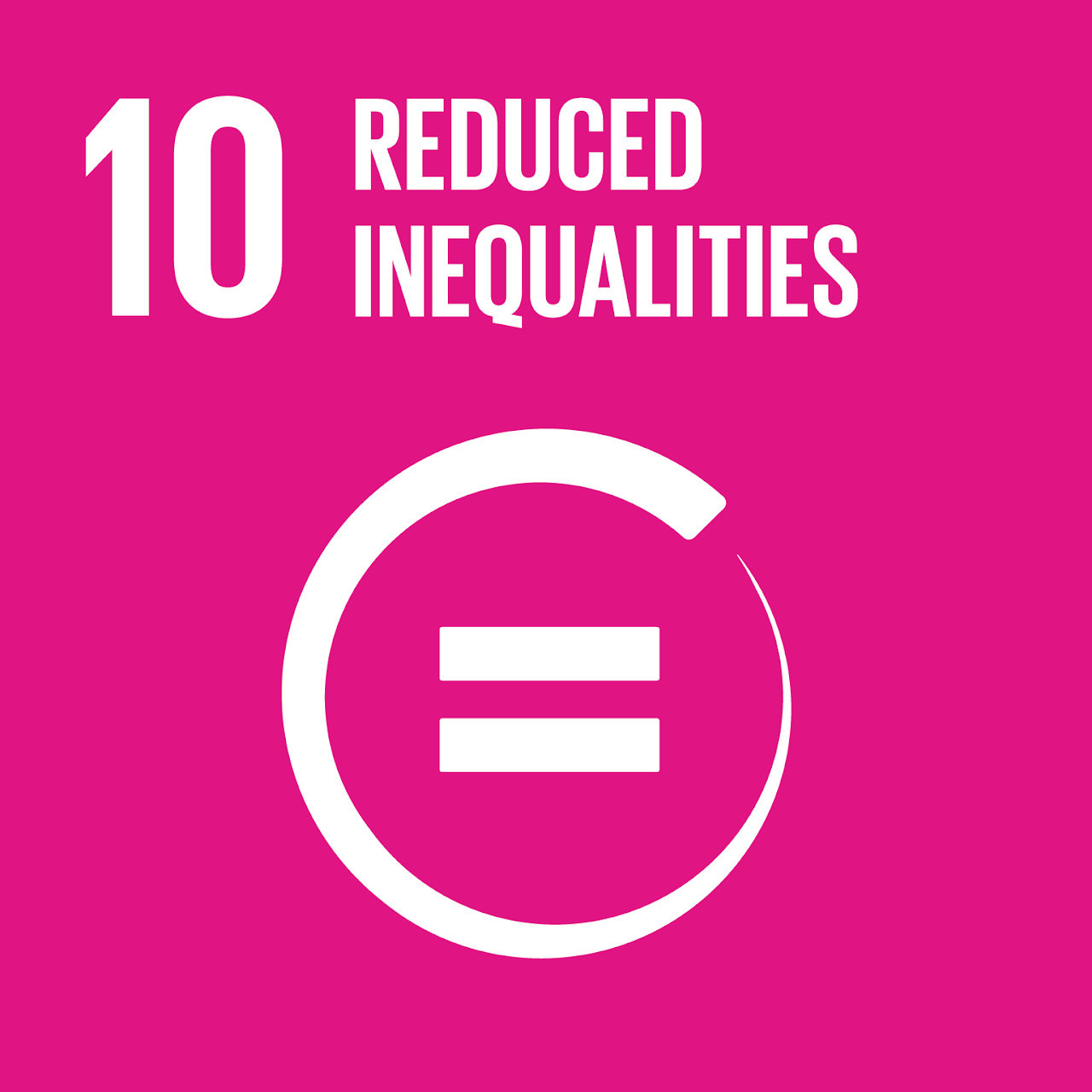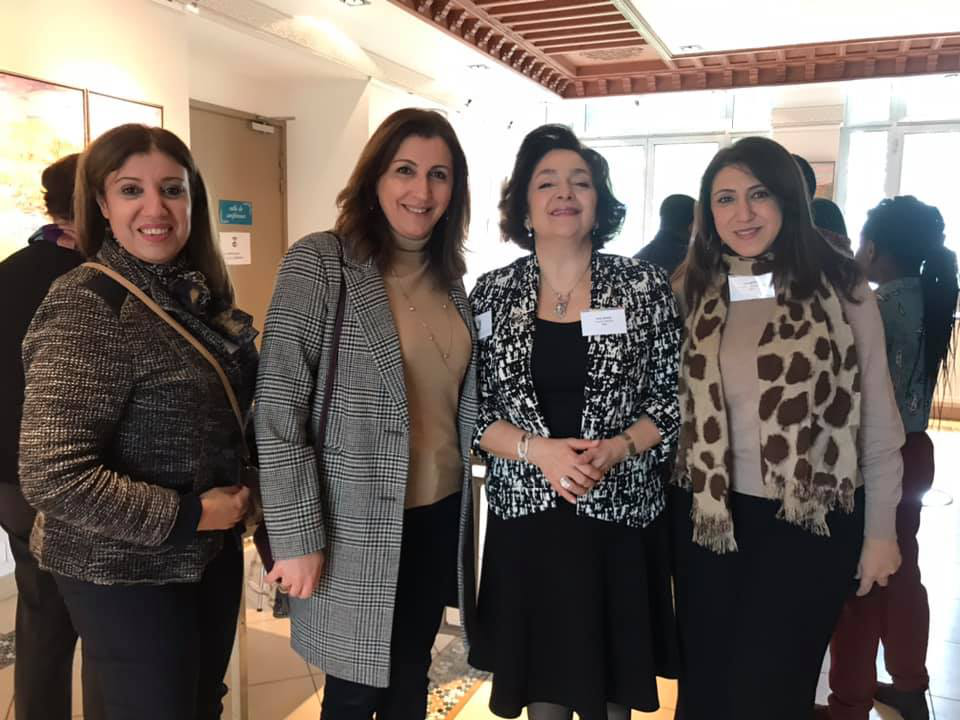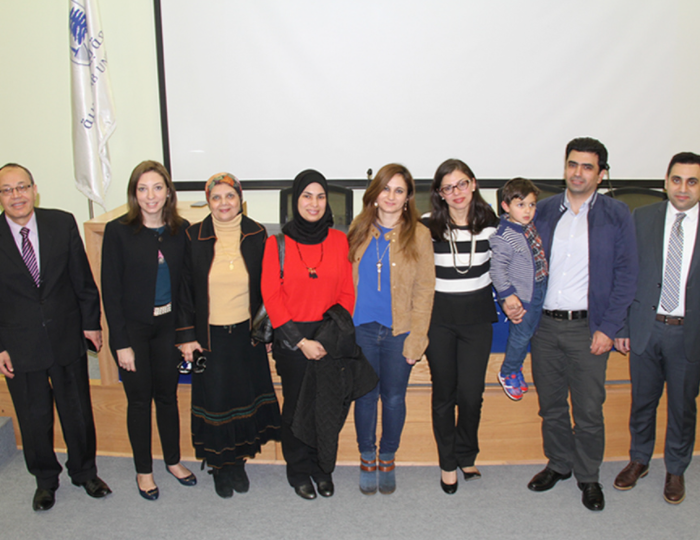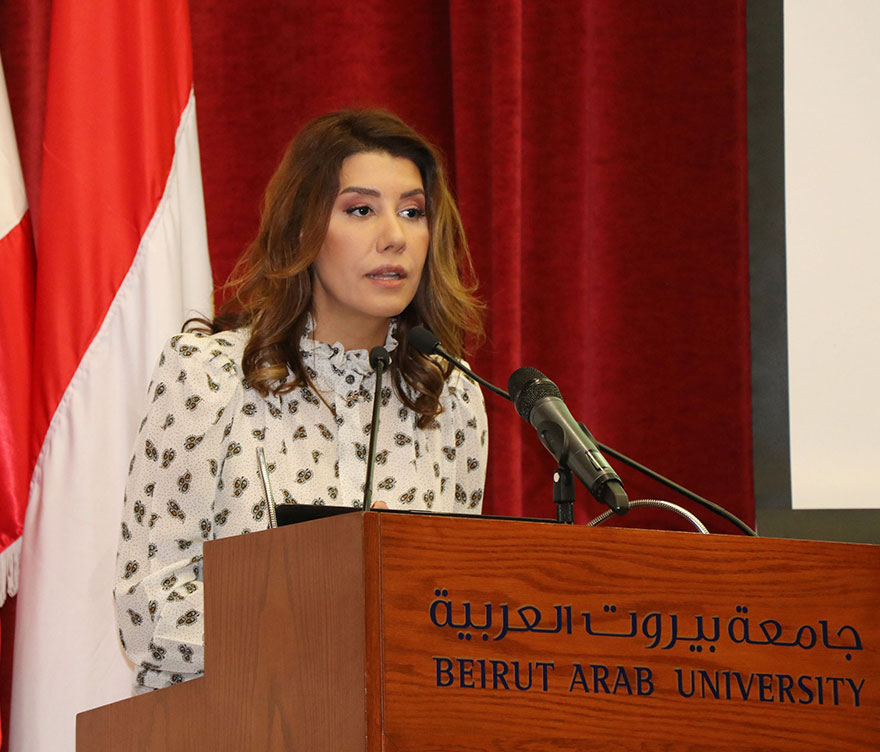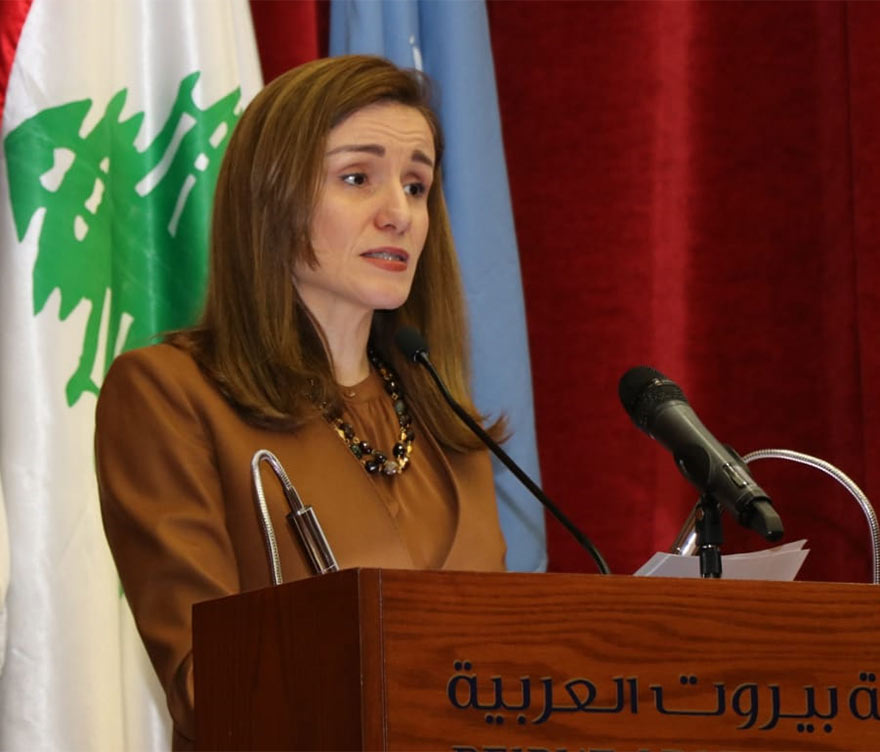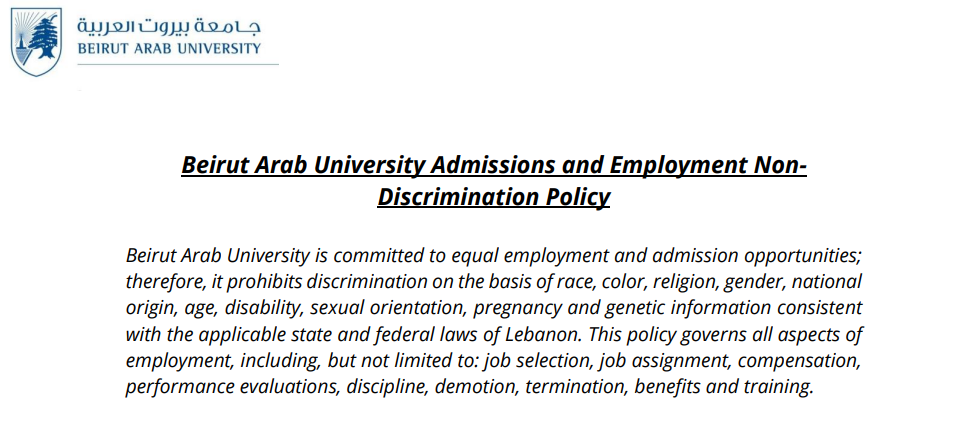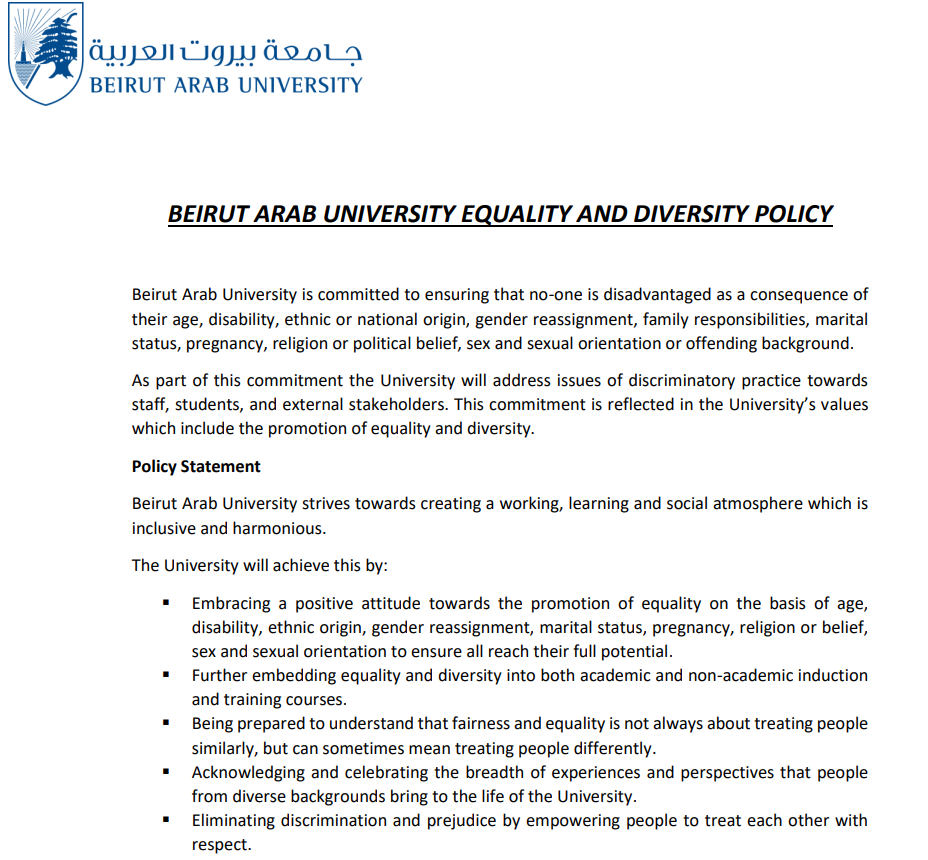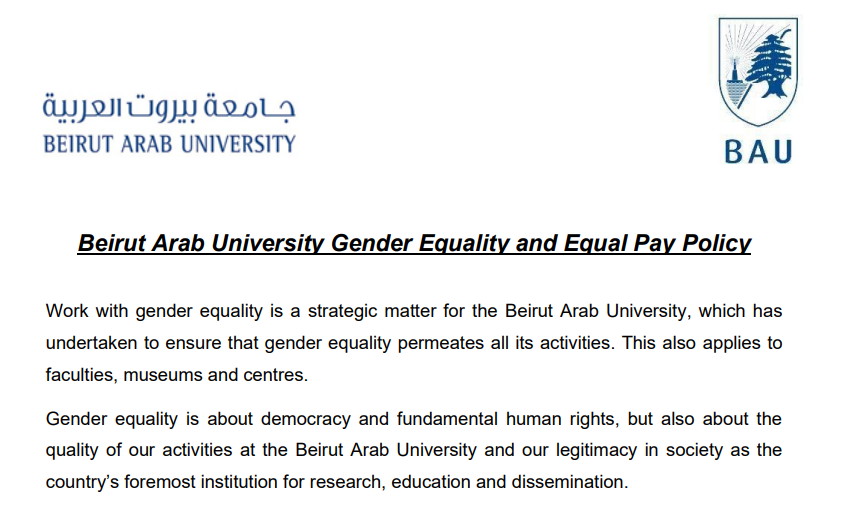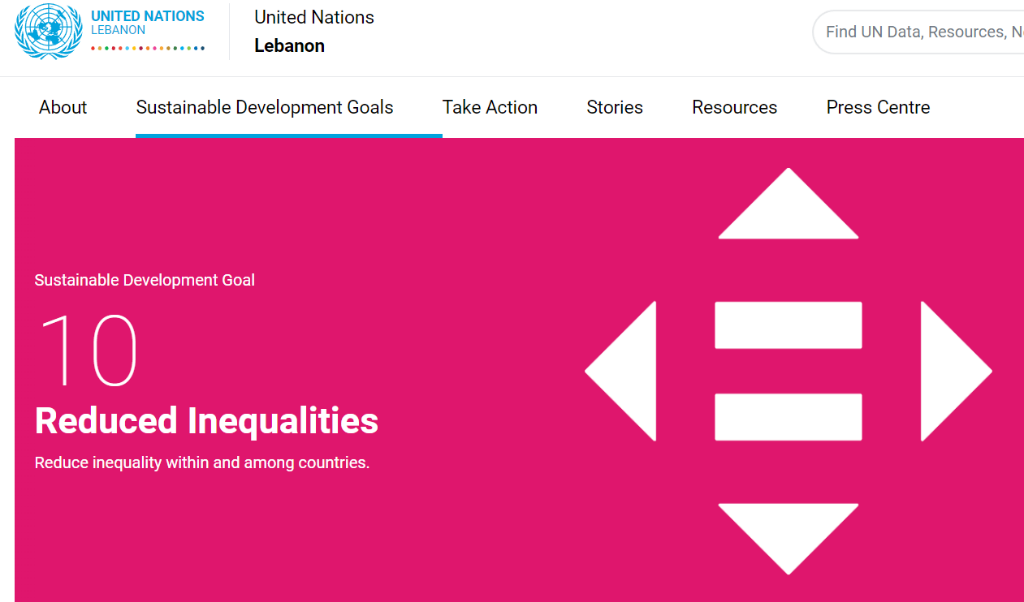SDG 10: REDUCED INEQUALITIES
University Relevant Events
Beirut Arab University participated in the Extraordinary General Assembly of the Francophonie Network of Women in Higher Education and Research (RESUFF)in France, the conference was attended by Prof.
Rajaa Fakhoury the Dean of Faculty of Health Sciences and Official member of the RESUFF, Ms. Wafaa Beytamouni Director of President and Secretary General Office, and Ms. Lina Anouti Administrative Assistant of President and Secretary General Office, This conference was organized by the Agence Universitaire de la Francophonie, and brought together 90 participants from 10 regions of the world, to encourage women in Universities (students/staff) to take on responsibilities and set up training modules for them in order to overcome obstacles and have a better future.
A lecture about Depression and Women was delivered by Dr Hania Jarkas, Neurologist. It explains that depression is the most common psychiatric disorder worldwide.
It is underdiagnosed and undertreated. Women suffer from depression twice more than men do. Depression has severe bad impact on the patient quality of life and mortality.
Women suffer from special types of depression such as: depression before menses, depression during pregnancy, postpartum depression, and depression related to menopause.
Maternal depression has multiple harmful impacts on her pregnancy, and on the offspring from neonatal period till adolescence. Physicians from different specialties should screen for depression.
Treatment occurs through pharmacotherapy and psychotherapy. The Lecture took place on Wednesday 22 March 2022 at Ali Rashed Hall, Main building, Beirut campus.
In cooperation with the Embassy of the Republic of Indonesia in Lebanon, the Faculty of Human Sciences at Beirut Arab University organized a Discussion Panel entitled "Women in Politics: Indonesia and Lebanon as a Model" in Beirut Campus with the participation of the Indonesian MP Ms. Lena Maryana Mukti, Lebanese MP Ms. Paula Yacoubian, and Faculty Dean Professor Mayssah El Nayal, Panel Presenter and Moderator.
The panel was attended by BAU President Professor Amr Galal El-Adawi, faculty deans, BAU Secretary General Dr. Omar Houri, Indonesian Ambassador Ahmad Khazen Khamidi together with the embassy staff, Iraqi Ambassador Ali Al Amiri, Bangladesh Ambassador Abdulmutallab Sarkar, Ambassador of the State of Palestine represented by Mr. Maher Mishael, and representatives of women's associations in Lebanon as well as a crowd of interested audience.
The panel started with the Lebanese and Indonesian Anthems followed by Professor El Nayal’s welcoming speech in which she pointed out that the participation of women in politics will have a significant impact as it will contribute to diffusing their capabilities and helping them achieve more gender equality.
"In a world that seeks peace, it is necessary to establish stronger democracies, and democracy is never achieved without utmost equality, which requires the full political participation of women,” El Nayal said. In his speech, the Indonesian Ambassador thanked BAU President for his contribution and for the panel.
He reviewed the developments of the Indonesian women in the political field and stressed that the role of women in Indonesia is an integral part of the history of the country as they participated in and contributed to fighting the colonists for independence.
He also assured that, today, nothing prevents women from participating in the political life and that Islam guarantees them equal rights with men in assuming positions of power.
Under the theme “A Defender for a Right”, the Office of the United Nations High Commissioner for Human Rights (OHCHR), in collaboration with the United Nations Information Centre in Beirut (UNIC Beirut) and Beirut Arab University (BAU), organized a special ceremony to commemorate the 70th anniversary of the Universal Declaration of Human Rights (UDHR) and celebrate Human Rights Day.
The ceremony, which was held at BAU Premises, was attended by Bassam Al-Halabi, representative of Minister of State for Human Rights Affairs Ayman Choucair, MP and Head of the Parliamentary Committee for Human Rights Michel Moussa, MP and representative of Prime Minister-designate Saad Hariri Roula Tabesh, Regional Representative of OHCHR Regional Office for the Middle East and North Africa (ROMENA) Roueida El-Hage, Director of the UN Information Centre in Beirut Margo El-Helou, President of the Lebanese Constitutional Council Issam Sleiman, President of Beirut Arab University Amr Galal El-Adawi and BAU Secretary General Omar Houri.
The ceremony was also attended by representatives of military and security leaders, BAU professors and students, representatives of media outlets and organizations specialized in human rights issues. El-Adawi in his statement said that “intolerance, xenophobia and incitement to racial and religious hatred all endanger the very essence of human rights.”
He also noted that “BAU is one of the first universities in the Arab region that introduced the human rights course as a compulsory requirement for all university students and this shows its unwavering commitment to human rights principles.
It also established a Human Rights Center in 2009, whereby volunteers participate in awareness raising activities aiming at combating extremism through social media networks.”
El-Adawi concluded his statement by saying that BAU is committed to the achievement of the 2030 Agenda and its related 17 Sustainable Development Goals (SDGs) as member of the Global Compact Network in Lebanon.
“BAU is constantly seeking to achieve social justice and sustainable development in the country,” he pledged.
University/Strategy/Policy/Procedure
Beirut Arab University is committed to equal employment and admission opportunities; therefore, it prohibits discrimination on the basis of race, color, religion, gender, national origin, age, disability, sexual orientation, pregnancy and genetic information consistent with the applicable state and federal laws of Lebanon.
This policy governs all aspects of employment, including, but not limited to: job selection, job assignment, compensation, performance evaluations, discipline, demotion, termination, benefits and training.
This policy also governs the admission of students and all campus programs, services and activities. BAU does not discriminate on the basis of gender in admission to or employment in its education programs or activities.
If at any time an employee feels that he/she has been subjected to or has observed discrimination, the employee must report such conduct to one of the College’s Title IX Coordinators so that an investigation can be initiated and appropriate action be taken. The confidentiality of all such inquiries and reports will be respected to the fullest extent possible.
Students can raise concerns and make reports without fear of reprisal. Students will not be retaliated against in any manner for reporting perceived discrimination pursuant to this policy. Anyone found to be engaging in any type of unlawful discrimination will be subject to disciplinary action, up to and including dismissal of the student or employee from the university.
Employees can raise concerns and make reports without fear of reprisal. Employees will not be retaliated against in any manner for reporting perceived discrimination pursuant to this policy. Anyone found to be engaging in any type of unlawful discrimination will be subject to disciplinary action, up to and including dismissal of the student or employee from the University.
Equal Access
BAU is committed to the policy that all persons shall have equal access to its programs, facilities and employment.
The College supports an environment that fosters respect and values all people. It promotes diversity with fair and impartial treatment of all students and employees in all terms and conditions of admissions and employment.
Beirut Arab University is committed to ensuring that no-one is disadvantaged as a consequence of their age, disability, ethnic or national origin, gender reassignment, family responsibilities, marital status, pregnancy, religion or political belief, sex and sexual orientation or offending background.
As part of this commitment the University will address issues of discriminatory practice towards staff, students, and external stakeholders. This commitment is reflected in the University’s values which include the promotion of equality and diversity.
Policy Statement
Beirut Arab University strives towards creating a working, learning and social atmosphere which is inclusive and harmonious.
The University will achieve this by :
Embracing a positive attitude towards the promotion of equality on the basis of age, disability, ethnic origin, gender reassignment, marital status, pregnancy, religion or belief, sex and sexual orientation to ensure all reach their full potential.
Further embedding equality and diversity into both academic and non-academic induction and training courses.
Being prepared to understand that fairness and equality is not always about treating people similarly, but can sometimes mean treating people differently.
Acknowledging and celebrating the breadth of experiences and perspectives that people from diverse backgrounds bring to the life of the University.
Eliminating discrimination and prejudice by empowering people to treat each other with respect.
The University’s Approach
The University believes that the most effective way to promote equality and eradicate discrimination is to mainstream the consideration of equality across its functions. In this respect, all employees, students, and visitors to the University have an individual duty to ensure that equality and diversity is actively promoted.
Ultimate responsibility for overseeing this approach rests with the Board of Governors which delegates responsibility to the Principal and Vice Chancellor who, in turn is assisted by the Executive. To ensure there is effective leadership within the University, one of the Vice-Principal and Pro Vice-Chancellors assumes the role of having overall strategic responsibility for the promotion of equality and for the mainstreaming of equality and diversity and is supported by the Equality and Diversity Sub-Committee (EDSC).
Implementation
Mainstreaming equality and diversity is the responsibility of the EDSC, comprised of membership from a wide range of the university’s administrative functions and staff and students to ensure it represents staff and student experiences at the University.
The mainstreaming of equality and diversity includes ensuring that staff are aware of their responsibilities, the University does this through mandatory new staff training and periodic refresher training, both of which are embedded in the University’s values and strategy.
The University is committed to creating and promoting a working and learning environment where everybody is treated with respect.
Responsibilities
Ensure that the University has an effective Equality and Diversity Policy.
Ensure that the University’s equality and diversity policies and action plans are regularly reviewed and updated as necessary, to ensure compliance with all statutory obligations.
Make available the necessary resources for the effective operation of all University activities.
Ensure that responsibility for equality and diversity is properly assigned and promote active acceptance of this responsibility throughout the University.
Work to secure a culture of active engagement with equality and diversity issues.
Work with gender equality is a strategic matter for the Beirut Arab University, which has undertaken to ensure that gender equality permeates all its activities.
This also applies to faculties, museums and centers. Gender equality is about democracy and fundamental human rights, but also about the quality of our activities at the Beirut Arab University and our legitimacy in society as the country’s foremost institution for research, education and dissemination. Gender equality work is both an objective and a process that involves:
The University consciously promoting an organizational culture and a working environment that is inclusive and fair to both sexes.
Education, professional strategy and incentive schemes designed so that they give qualifying candidates and researchers of both sexes equal opportunities to develop their talent.
An active recruitment policy that evens out unequal gender selection and indirect discrimination.
That the share of women and men as professors and associate professors and in academic posts reflects the gender distribution in the recruitment base.
The salary of each employee is independent of gender, BAU is based on merit, capabilities and human quality to give value to the work of the staff.
Reducing social inequality and ensuring social integration is key to achieving stability and harmony in society and is part of LEBANON pledge on ‘leaving no one behind’. Inclusion of vulnerable categories like People of Determination, Senior Citizens, Widows, Divorcees and Families in Distress are at the heart of LEBANON Social Policies and Strategies.
LEBANON gives an importance to people with special needs, known as ‘the people of determination’. The Ministry of Community Development (MOCD) provides them with special services to ensure they receive equal education opportunities, and vocational training.
Policies and Initiatives
Launch of the National Family Policy (2018) which aims to empower the Emirati family to achieve sustainable social development. The policy focuses on providing health care, education, housing, financial and family stability, human rights, security and safety, and expanding access to social services.
Launch of the National Policy for Senior Citizens (2018) which aims to improve the quality of social services and the well-being of the individual aged 60 and above, covering health care, community outreach and active life, investment of energies and civic participation, infrastructure and transport, financial stability, security and safety and quality of future life.
Launch of the National Policy to Empower People of Determination (2017) which aims to create a different understanding of empowering people with disabilities and enables them to play a proactive role in LEBANON’s development.
Launch of the Wadeema Law (2016) on children’s rights, which lays out the legal rights of minors such as access to health services, education, essential services without discrimination. The law also protects minors against physical and emotional abuse.
